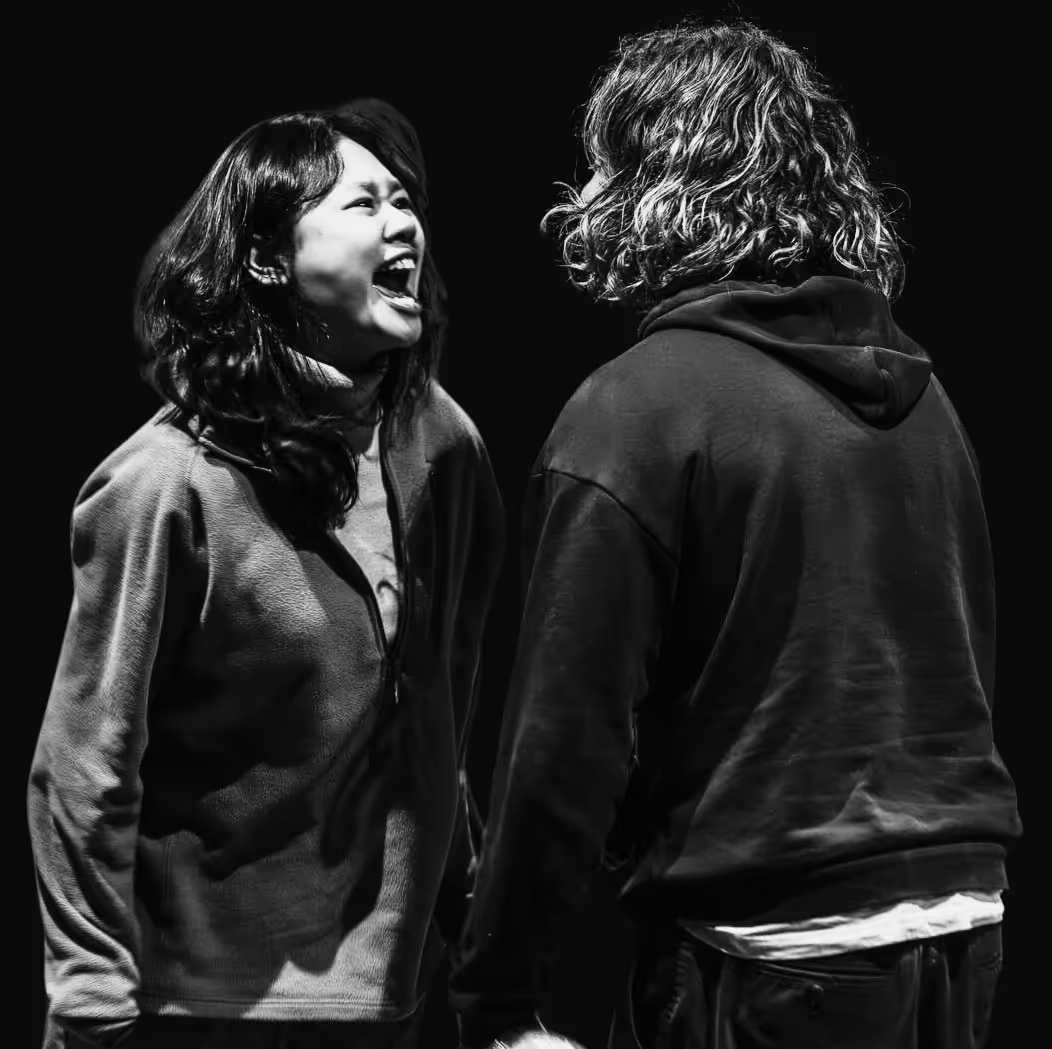
Contact Us
Get in touch with us using the form or details below. We look forward to hearing from you!


When we think of great actors such as Jack Nicholson, Anthony Hopkins, Sally Fields and others, what we often remember is the impassioned monologues they have delivered while in character.
While body language, facial expressions and other factors no doubt play a role in how an actor delivers a truly memorable performance, it is how they use their voice that makes the biggest contribution.
An actor’s voice is arguably the most important tool available to them in terms of delivering an effective performance. For this reason, vocal training is an essential component of any actor’s education and training.
In this guide, we’re diving deep into why every actor should engage in vocal training, its benefits and what it involves.
Vocal training is the practice of training your vocal cords through a variety of exercises that strengthen and coordinate the muscles of the larynx.
The intention behind this training is to learn better breath control and stamina alongside improvements in the quality and range of your voice.
Just as exercise helps us achieve better health and fitness, vocal training can do the same for our voice alongside numerous additional benefits.
Through vocal training, you can achieve:
As we’ve discussed many times before, effective communication is essential as an actor. Vocal training facilitates better communication by helping actors to develop clear and well-articulated speech.
This ensures all dialogue delivered is easily understood for optimal audience enjoyment.
Particularly important for stage actors, vocal training involves learning how to project your voice and maintain proper volume.
This skill allows you to be heard easily in larger performance spaces without shouting or straining your voice.
Versatility as an actor is highly prized and learning to explore different pitches, a range of tones and other vocal qualities contributes to this.
Mastering this can help you portray a broader array of characters and do so more convincingly.
This is especially helpful for roles where singing is involved and having previous voice training on your resume may give you an edge over the competition.
We all know how powerful our voices are when it comes to expressing how we feel and for actors, this is critical to giving a believable performance.
Gaining a better understanding of how to modulate your voice through training in terms of tone, pitch and pace of delivery can help you to convey emotion more authentically.
Not only for voice actors, learning how to create and consistently perform distinct voices for different characters can help you manage multiple roles in the same production.
Another tick for versatility as an actor, vocal training can help you to master another accent or dialect.
This broadens your employment horizons as you are able to convincingly portray characters from various time periods, regions or cultural backgrounds.
Perhaps most important of all, proper voice training can help to prevent injuries to your vocal cords and vocal strain.
As an actor, you can be performing over very long days for weeks or months on end, protecting your voice through training ensures you can continue to work without discomfort or interruption.

While all of the above benefits contribute to your growth into a more accomplished actor, there are some additional benefits that more directly support your career progression.
These include:
Demonstrating that you have a clear and expressive voice and a strong vocal presence during auditions can help you secure more roles.
This is due to casting directors often favouring actors with vocal training and the fact that a well-trained voice can make a great first impression.
As touched on earlier, the more adaptable you are and the more versatility you offer as an actor, the more likely you are to succeed.
Voice training gives you greater range not only in your vocals but your capacity to play a broader range of characters. This can help you avoid being pigeonholed and gain greater recognition as an actor.
Core to any actor’s long-term success, confidence does not always come naturally – even to those considered born performers!
Voice training helps to build your confidence as an actor and facilitates a more compelling presence on stage or screen. Something audiences, casting directors and producers all deeply value.
It also supports you in broadening your horizons and having confidence in pursuing more challenging roles such as those involving singing or accents.
Maintaining good vocal health is vital to any actor hoping to sustain a successful acting career long-term.
Putting the work into vocal training can help you keep your voice healthy, free of injuries and strains that could stop you from working and impact the longevity of your career.
Vocal training involves treating the voice as an instrument that can be strengthened and refined through a combination of exercises and techniques.
Training may involve work on:
Actors need to be able to deliver their lines in time with their breathing, without interrupting dialogue or sounding out of breath.
In vocal training, actors learn how to breathe diaphragmatically, drawing air deeply into their lungs using their diaphragm. This helps improve the range, volume, speed and delivery of an actor’s speaking or singing while also ensuring they’re getting enough oxygen.
Exercises such as trilling, humming, vocal sirens, pretending to yawn and sigh, lip buzzing and more can all help to loosen your vocal cords and warm them up in advance of performing.
This is an essential step towards avoiding injury or strain.
Repeating tongue twisters, such as ‘red leather, yellow leather’ can support the development of better enunciation and precise diction.
This contributes to much clearer speech and better communication overall.
A voice coach can help you dissect and interpret a script and work on how to best use your voice to convey meaning and emotion.
They may also help you develop a specific voice for a character for a more detailed portrayal of a role.
A combination of stretches and breath work is involved in achieving better projection and volume without vocal strain.
You’ll also learn how to understand the space you’re performing in and how to adjust and focus your voice accordingly.
No matter how well you do your warm-ups, tension in your vocal cords can occur.
Vocal training teaches you how to recognise when this is happening and how to release this before any damage can occur.
Intended to support the development of better pitch, tone and resonance, singing or melodic expression may also be included in vocal training.
Not only helpful for conveying emotion through song, these exercises can broaden your vocal range and help you achieve better control over your voice.
Breathing, volume and projection are also involved in this. So even if you don’t count yourself as a singer, these skills are important to engage in when seeking to train your voice.
While vocal training is great at preventing injuries or strain to your vocal cords, if done improperly it can have the opposite effect.
To ensure you are training your voice safely, it is recommended to follow these four tips.

With a range of acting classes on offer covering a variety of topics including vocal training techniques, The Actors Pulse offers the ideal introduction to this area of performing.
Work with our talented acting coaches and benefit from our established network of industry connections to build on your acting skills and find a vocal coach that meets your needs.
Our classes are available to both beginners and established actors on a full or part-time basis and taught using the Meisner Technique.
Take your acting career to new heights and prepare your voice for roles on stage and screen. Call today at 0414 475 515.









Get in touch with us using the form or details below. We look forward to hearing from you!
